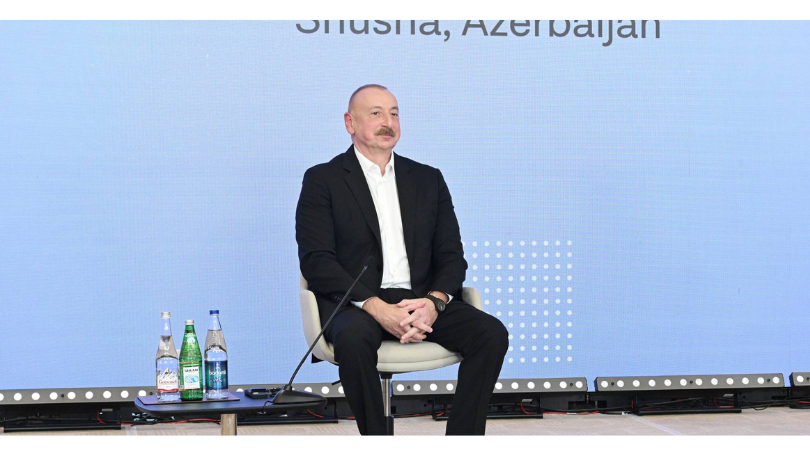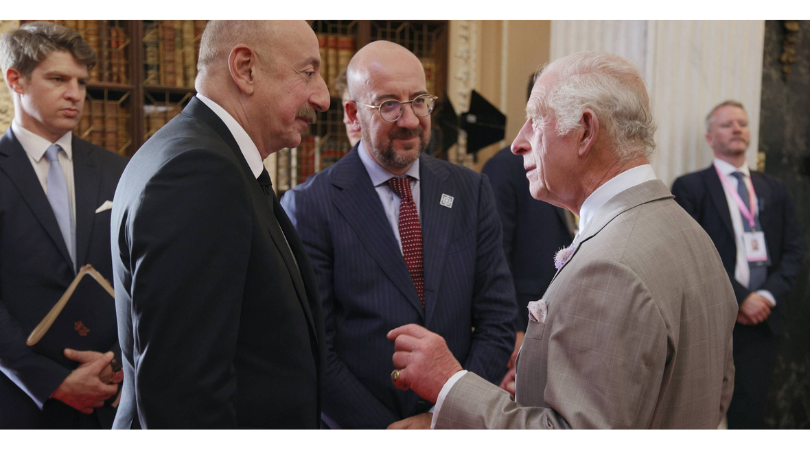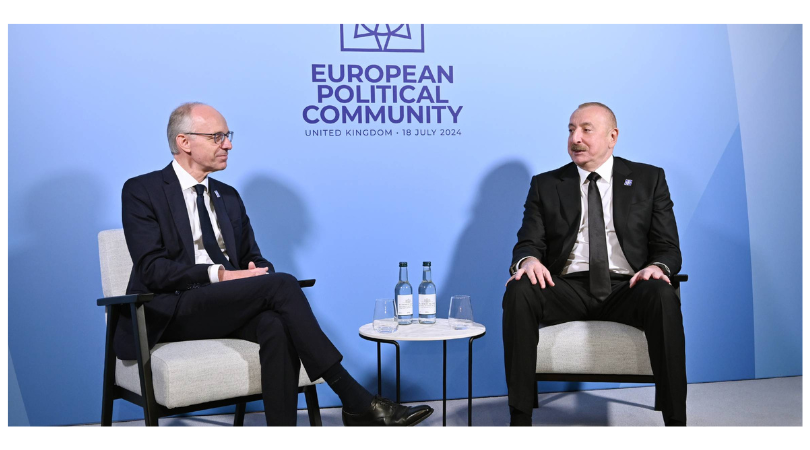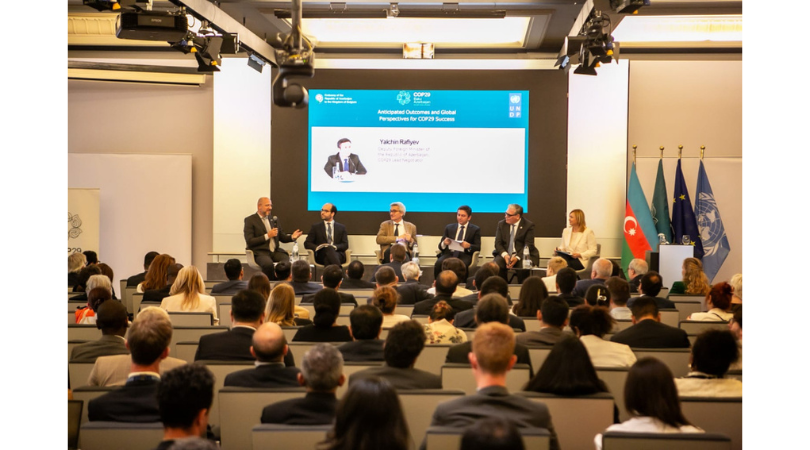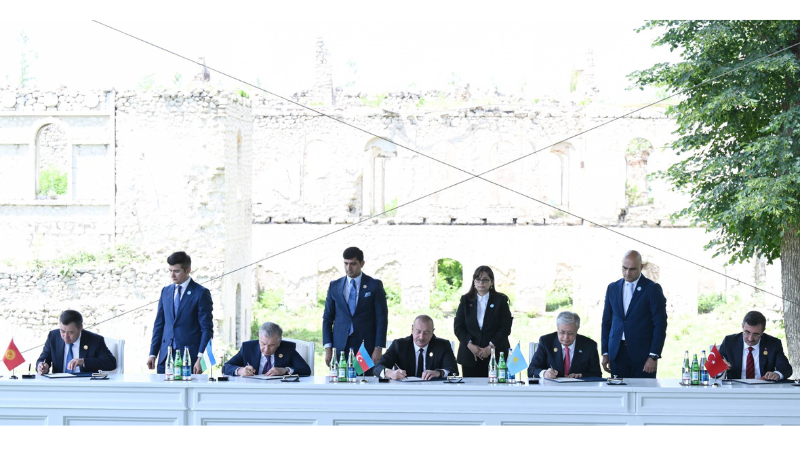Video-interview of ambassador Fuad Isgandarov to "EurActiv" news portal
Ambassador Fuad Isgandarov: Criticism against Azerbaijan is orchestrated
Q: The “Azerbaijan laundromat” revelations are casting a shadow over a broadly positive agenda of the Azerbaijan-EU relations. Could you remind what is at stake?
First of all, I would like just to say, that not everything is as bad as media tries to present. Azerbaijan is really becoming closer and closer to Europe, in a lot of directions. We are really very seriously working on the construction of a new Southern gas corridor. It consists of four elements: Shah Deniz 2 exploration part is done, already finished, approximately 90%, then it is going to the Southern Caucasus through Azerbaijan’s and Georgia’s territory, also the same figures, then TANAP it is going to the territory of Turkey, this goes also 86, 87%, it depends on the approach, and then it goes through the Trans-Adriatic pipeline from Greece, Albania to Italy, it also goes well. We have a very good economical, commercial basis for developing our political dialogue; it is not just a story about the energy security, about Azerbaijan which is supplying Europe by energy. No, we assess this construction, this Southern gas corridor, as a very strong, good basis for exceptional political dialogue. What is the most serious problematic issue for the Eastern Partnership? It is in most cases it is a compilation of six for example bilateral tracks of the European Union with six different countries. In case of the of the Southern gas corridor: Look, we have Azerbaijan, strategic partner of the European Union in energy, we have Georgia, which is associated partner, we have Turkey, which is still a candidate country, you have Greece, which is a member state, we have Albania, a candidate country, and we have Italy, a member state. So look, such kind of comprehensive project, that’s exactly what European Eastern Partnership project needs: project management - and that is what we delivered. The influence of this is crucial for bilateral tracks of Azerbaijan, because on this strong commercial economical basis we are trying to build up our political dialogue as well as for the multilateral type of Eastern Partnership, because we are all together, all together - by the way other Eastern Partnership countries also enjoy participation in such kind of projects. As much as we are closer to Europe, as much criticism we are hearing. In most cases, mostly artificial, unfortunately. And we know who is behind these attempts, because both sides – the European side, the Azerbaijani side – we are all in favour of a stronger relationship. The closer Azerbaijan is to European market, the better for us, also for energy sufficiency and security of the European Union. The closer we are to Europe, the better for us from the political point of view, because we become closer to the European space of values. But there are some forces which are always in favour to cut such kind of development, such kind of the movement from Azerbaijan to the EU side. For your information, we launched our negotiations on agreement, you know, in February 2000 of this year and in a short period of time, just three months, we had five rounds of negotiations, it has never been known before in our relations and relations with other Eastern Partnership countries. Just in three month, five rounds of negotiations. It shows how strong we are, both sides, in our decision to have it, to get it. And then, last but not least, when it happened, it happened in the beginning of September, just when the preparation for the Brussels summit were starting. So we see three elements, which make our opponents of Azerbaijani-EU-relations a little bit nervous. That’s why they use this criticism – again, in most cases artificial criticism – to shake up the relations, to destroy them, as minimum to postpone some political decisions.
Q: Media revelations concerning the so-called “Azerbaijan laundromat” allege that your country used 2.9 billion paid via shell companies to politicians in the EU to paint a positive image of your country and ignore human right abuses or arrest of journalists. How could you respond to that?
That laundromat, what does laundromat means? It is an absolute artificial fake name. Just one example: we sent our press to a Belgian media, it appeared in Belgium media as well, they put the number 1 million or 300.000 euros of transactions from offshore zones, excavators, medical equipment, some infrastructural equipment, some equipment for dentists, I don’t know, jewellery and a lot of things that have been bought by Azerbaijani consumers from the Belgian site but it was done by offshore zones which is the part of the European Union market by the way. It is an offshore zone which was why Azerbaijan and other newly independent countries, they use it, because they don’t have a direct free trade zone with our European partners and for our companies in persons who are buying them in some cases it is better to use this transactions than for example to wait for special procedures which should be done in case of the European Union. We hope that a new agreement will give us new opportunities for our trade or direct financial cooperation, but nothing criminal was done in case for example again one case, in case of Belgium, because I am ambassador to Belgium, no transaction has been spent for I don’t saw terrorism, or corruption, or drugs, or any criminal sphere of activity. But it was presented as money-laundering and especially pre-created such kind of artificial definition. It shows that when we gave our press release, it was published and nobody came back to this issue again, because it was true. I think, we can find a lot of such kind of explanations and if you ask me, why I think it is mostly artificial, I just give you the logic and dating of what happened. Fifth of September, the first article in the Guardian, signed by an Armenian journalist, was a huge criticism with this “laundromat” wording, then few days after again a new article was the same medium with a huge criticism of the Southern gas corridor, the Trans-Adriatic gas pipeline, then immediately reaction of the European Parliament, which without any clarification put out very critical even insulting wording in the resolution about human rights and corruption in the world, where only the name of my country was mentioned. Imagine, there are 193 members of the United Nations and this report was totally about all the world and the name of one country was mentioned in the amendments, which were adopted by a very, very minor majority of European parliamentarians. It shows that it was artificially done and there are some forces that are against Azerbaijani strong intention to be closer to Europe, to work with Europe, to be a part of the European space of values and the European market.
Q: You reject what you consider fabricated black PR. But do you admit there is a need for some change in Azerbaijan?
I would like to say, I never used the word fabricated, they used some real transactions, presented them as money-laundering. I think, it’s not a correct approach, for example in the media which I saw here being an ambassador to Belgium, I saw a lot of pictures with a member of government and it was presented as a governmental case. But it was done, transactions have been made by persons, by companies just to buy something, to sell something for infrastructural projects. It was just the transactions, like financial transactions. Nothing connected with money laundering procedures. And it happened in all the European Union countries at one time. Imagine, in one week we did have approximately fifteen articles only here in the Belgian media. Is it suspicious, you know that it is orchestrated? I don’t understand, maybe it could be done for a long period of time, but for me it’s really absolutely clear that it was orchestrated. Orchestrated from one centre and there are some forces who are behind all these processes. Again, they can do everything they want. We understand that the closer we are to our European partners, the more, how can I explain, such kind of steps will be done against this closer partnership, because Azerbaijan needs Europe as a space mentally close part to the world, as a space of values and of course as a market. But Europe itself needs Azerbaijan in your neighbourhood. Frankly speaking, I just recently came from a meeting of the EEAS, there was a representative of different religious confessions of Azerbaijan. Everybody lives in peace and security, so many Protestant and Catholic Christians, Jews, Muslims, Sunnis and Shias – no problematic issue. Have you heard about any terroristic threats from Azerbaijan or illegal immigration from my country or any radicalism that came from my country? No, and in such a situation, when you have such a complicated neighbourhood, the European Union I mean, Azerbaijan as a small 10 million country, predictable, reliable, secular, absolutely respectful and tolerant to all the religions. Why should we insult, offend this country, a young country with an absolutely clear aspiration to be closer to Europe, without any romantic and idealistic estimation about the membership? Be sure, it’s not in our agenda.
Q: The European Parliament has also voted for a comprehensive investigation to be made into attempts of Azerbaijan and others countries to influence EU decision-making through illicit means. How does your country react to the vote and will you collaborate in such an investigation?
One example and everything will be clear. From 2009 until 2017 the European Parliament adopted nine exceptionally critical resolutions about my country. What do you think? Does it mean that we are lobbying successfully? They blame, that we are lobbying there? If we are lobbying we should have something in our hands, but instead of it we have nine critical resolutions. Just for information, just a few about other Eastern Partnership countries and zero about for example Armenia nothing, but nine critical about us. About what kind of lobby can we talk about? If we have nine critical resolutions in the European Parliament in just eight years, every year. It is not true. Sometimes we have some advices from our friends. We need some advices, because we are a young country which is 25, 26 years old. Excuse me, what kind of lobbying we can talk about; if we have in the European Parliament such kind of number of critical result, we are number one among Eastern Partnership countries. It’s an absolutely artificial approach, that’s what I am sure about.
Q: Has your work in the European Commission been affected, or is it still business as usual?
Business as usual. Business as usual, because we understand, we are bureaucrats; we understand that there are so many challenges. Just today two delegations came for two rounds of negotiations for a new agreement with Azerbaijan, just yesterday another delegation came. Those are mostly delegations of different religious confessions, they just had a meeting with the European External Actions Service and we are working very seriously while waiting for the delegation from European institutions from Baku. Very, very soon I am going to Baku to accompany two very high level delegations. So we are working more intensively now, facing such kind of challenges.
Q: So you suspect foreign interests behind the banking records leak which led to the “Azerbaijani laundromat” revelations?
It depends what kind of leakage we are speaking about. Again, it happened with all the countries all over the world. You can see, it’s not story only about my country. Well, the question is, when my country was highlighted in this case because we do have some achievements in our economic development. Yes, most probably. We are really a strong economy. Nobody would like to talk about any economic activity of the poor countries, but in our case we are really one of the most successful countries in the Eastern Partnership in the space of the former Soviet Union. The second option is, why was it highlighted now? Because, again, we are going to a new level of the relationship. We are approaching I would like to say this very clearly; we are approaching this point of no return in our relationship with the European Union. That is crucially important to understand. I think it becomes closer and closer. We haven’t passed this point of no return yet, but it’s mostly not only a political dialogue but also commercial energy transportation routes. Look, what is one of the best ways in the connection between Asia and Europe? So shortest and safest way is over the Southern Caucasus. What is the best way for more active cooperation between the European Union institutions and such a complicated which is around my country? My country, we do have influence, we do have some renommee in the region. There are good relations with central Asian countries. Normal, very predictable and ongoing relations with Iran, which is especially important for our European friends that try to engage with Iran in the implementation of the nuclear deal. We have very normal relations with Russia without any new headaches for our European friends. I don’t think our European friends need such kind of new headaches. We do have some problematic issues. There is the occupation of our territory, there are some forces who are occupying and who are behind this occupation. They are highlighting this issue to present Azerbaijan as something barbarian, it’s absolutely clear for us. But it doesn’t mean that we don’t accept any criticism. No, if you ask me, I would just like to invite you to my country and to show how we manage to combat against the corruption on the low level. So we have one window approach and not bureaucracy and we can go and find the solution of all the problematic ways without any additional desks. Those are very specific different reform which is provided in my country and we are very proud of it. The corruption is one of the lowest maybe in the region in the world. Of course, we have a huge project. Look, I would like just to say one very interesting important thing, we just signed the continuation of Azeri-Chirag-Gunasli, maybe you have heard. It’s an oil project we have signed in the beginning of the 90s and now in 2017, September 13 ministers from Britain, Norway, you know, governmental representative companies; they came to Azerbaijan just to prolong this project. 500 million barrel of oil, perfect. These media attacks happened exactly in those days. You can see so many coincidences, I put coincidences just in brackets, but it is not coincidences. I kind of ask you, if you can, put this wording on the frontline of the article of the interview, that as much as we are becoming closer to Europe, the more criticism we are hearing or unfair steps from others we are witnessing from other players, not from European Union institutions, because we have really good relations with them, the executive institutions. So it is absolutely clear.
Q: If the attacks you are referring to are successful, what are the risks for Azerbaijan and for the EU?
They would like to create the so-called image of Azerbaijan; I mean these forces, that we are so-called Muslim barbarians, who are absolutely not fitting with European values. What does it mean? It means such a country, the European Union work or even negotiate at all. Very strange. We are a very secular country, if you will go to Baku; it’s a very European city. But why they did it? The second reason is, we are in war now and we have an ongoing negotiation based on the principle of unknowns of international law with Armenia. International law that’s in favour of independence, sovereignty and territorial integrity. But how this negotiation could be changed mentally, is just to present another part of the negotiators as something which is absolutely unpredictable, corrupted, non-democratic, barbarian and so on. Sorry, but is this a pragmatic approach? I don’t think so. We can do it again and again, but in the end of the day, believe me, I am sure about it, I am here for four years in this city as an Ambassador and I know from which level we started and what we achieved now and what we can achieve in the future. My vision is that for the European Union and European institutions it is crucially important to have a good neighbourhood and particularly good reliable partners in the Muslim neighbourhood. And Azerbaijan has a mostly Muslim population, the best example of it.

